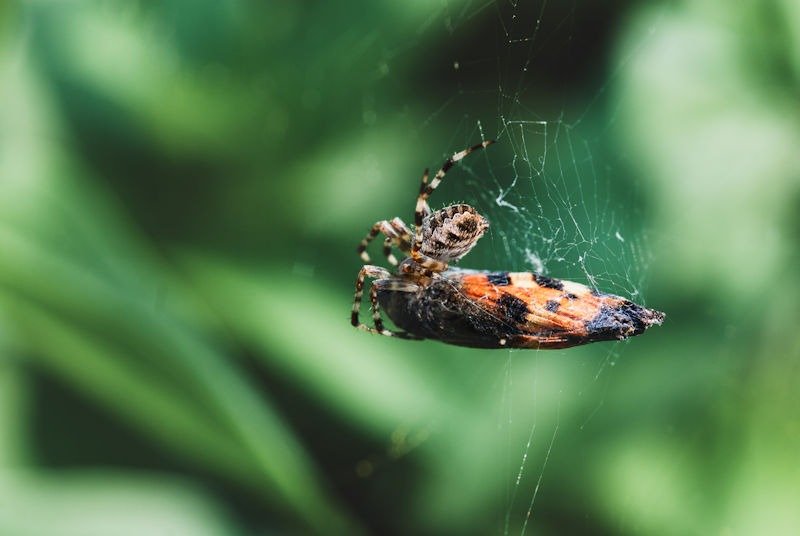Spiders can be unwelcome guests in any home, especially in regions like Southern Maryland and Northern Virginia. Understanding the link between insects and spider infestations is crucial for homeowners looking to maintain a spider-free environment. By eliminating food sources and employing various preventive measures, you can significantly reduce the likelihood of spiders taking up residence in your home.
Understanding the Food Chain
Spiders are natural predators that primarily feed on insects. The presence of other insects in your home can attract spiders, creating a food source that sustains their population. Common household insects that attract spiders include ants, flies, mosquitoes, and cockroaches. By addressing the root cause – the insects – you can effectively reduce spider populations.
Identifying and Eliminating Insects
The first step in spider prevention is identifying insect infestations. Look for signs such as droppings, shed skins, and visible insects. Pay attention to areas where insects are likely to thrive, such as kitchens, basements, and bathrooms. Once you have identified an infestation, use insect repellents and traps to eliminate the problem. Products like insecticides, sticky traps, and electronic insect killers can be effective in reducing insect populations.
Maintaining Cleanliness
A clean home is less likely to attract insects. Regular cleaning practices such as sweeping, vacuuming, and wiping down surfaces can help eliminate food particles and other attractants that draw insects. Focus on areas that are often neglected, like under appliances, behind furniture, and inside cabinets. Additionally, ensure that garbage is properly sealed and disposed of regularly to prevent attracting pests.
Using Natural Repellents
Natural repellents can be an effective way to keep both insects and spiders at bay. Essential oils such as peppermint, tea tree, and lavender are known to repel spiders and insects. You can create DIY sprays by mixing a few drops of these oils with water and spraying them in areas prone to infestations. Other natural repellents include vinegar, citrus peels, and cedarwood, which can be used similarly to deter pests.
Regular Inspections and Maintenance
Regular inspections are vital in maintaining a spider-free home. Check for signs of insect activity and spider webs in hidden and hard-to-reach areas. Address any issues immediately by cleaning the area and applying repellents. Maintenance tips include sealing cracks and crevices, repairing damaged screens, and ensuring that doors and windows are properly sealed to prevent insects and spiders from entering your home.
Conclusion
Preventing spider infestations starts with eliminating their food sources – the insects. By identifying and eliminating insects, maintaining cleanliness, using natural repellents, and conducting regular inspections and maintenance, homeowners in Southern Maryland and Northern Virginia can keep their homes spider-free. Taking proactive steps in insect control not only reduces the spider population but also creates a healthier and more comfortable living environment.
FAQ
Q: What attracts spiders to my home?
A: Spiders are attracted to homes with abundant insect populations, as they serve as a food source. Common household insects include flies, ants, and mosquitoes.
Q: How often should I clean to prevent insect infestations?
A: Regular cleaning, at least once a week, can help prevent insect infestations. Pay special attention to areas like kitchens, bathrooms, and basements.
Q: Are natural repellents effective against spiders?
A: Yes, natural repellents like essential oils, vinegar, and citrus peels can effectively deter both spiders and insects.
Q: What maintenance steps can I take to prevent spiders?
A: Seal cracks and crevices, repair damaged screens, and ensure doors and windows are properly sealed. Regularly inspect hidden areas for signs of insect activity.
Q: Can regular inspections really keep spiders out of my home?
A: Yes, regular inspections help identify and address insect and spider activity early, preventing larger infestations.
By following these guidelines and staying vigilant, homeowners can effectively reduce the risk of spider infestations and enjoy a pest-free home.
NEED HELP?
If you live in Southern Maryland, or Northern Virginia
FIND YOUR SOLUTION HERE
People, Pet & Pollinator Safe! Pest control for people who care.
